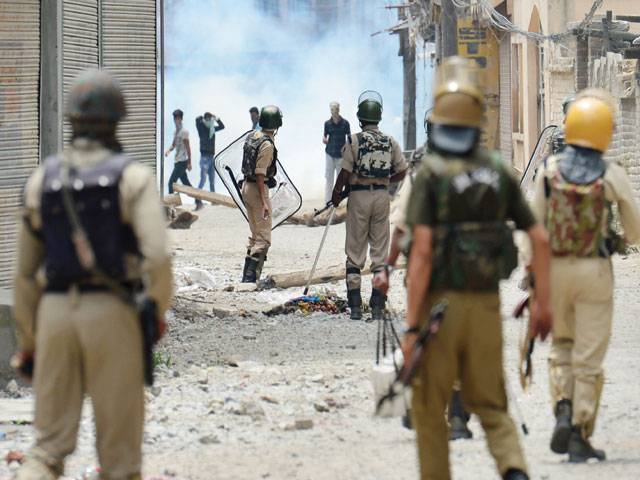ISLAMABAD - Kashmir is once again threatening to pit Pakistan and India against each other as the occupant forces have unleashed a wave of state-sponsored terrorism in the held territory.
Pakistan strongly condemned continued killing of innocent Kashmiris in Indian Occupied Kashmir yesterday as brutal force was used against the people protesting against the killing of a young rebel leader who had become an icon of resistance against oppression.
The foreign ministry said in a statement that “extrajudicial killing (on Friday) of Kashmiri leader Burhan Wani (commander of Hizbul Mujahideen) and scores of other innocent Kashmiris is deplorable and condemnable.”
As many as 21 people have been killed in some of the worst civilian unrest to hit the occupied valley since 2010. Around 200 people have been wounded in two days since Saturday, many of them protesters who were hit when government forces fired tear gas canisters and live ammunition.
Prime Minister Nawaz Sharif also expressed his ‘deep shock’ over the killing of Wani and civilians by the Indian forces.
“It is deplorable that excessive and unlawful force was used against the civilians who were protesting against the killing of Burhan Wani,” he said in his statement.
Foreign Ministry Spokesman Nafees Zakariya said such acts were a “violation of fundamental human rights of Kashmiris” and “cannot deter the people of Jammu and Kashmir from their demand for the realisation of the right to self-determination.”
He said Pakistan also had serious concerns over the detention of Kashmiri leadership in Kashmir and called upon the Indian government to fulfil its human rights obligations as well as its commitments under the United Nations Security Council resolutions.
Pakistan reiterated the solution of Kashmir dispute is only possible by the realisation of the right to self-determination, through a fair and impartial plebiscite under UN auspices, he added.
Kashmir has been divided between rivals India and Pakistan since 1947, but both claim the territory in its entirety. Tens of thousands of people, mostly civilians, have died in the fighting since 1989.
Thousands of residents of the disputed region are defying a government-imposed curfew to take to the streets in protest at the killing of Burhan Wani.
The state government has also cut off internet and mobile phone networks to try to stop the protests spreading. There were also reports of security forces attacking hospitals and ambulances treating the wounded.
“Attacking hospitals and ambulances is a crime under the international humanitarian law and Indian armed forces have been repeatedly accused of this crime in Kashmir,” said the Jammu Kashmir Coalition of Civil Society, a rights group, in a statement.
Among the 21 who died in two days was a policeman who drowned when angry protesters pushed an armoured vehicle into a river in the southern district of Sangam on Sunday, a police officer claimed.
Police say protesters have set police stations on fire and thrown rocks at army camps in the south of the restive region.
Officials at Pakistan’s foreign ministry said Islamabad was furious over the killings of the Kashmiris that threatened the dialogue efforts.
One official said if the Indian forces did not stop the blatant violation of the human rights in Kashmir. “For us Kashmir is the key issue, they cannot kill people there and speak of a dialogue. They have to prove their sincerity for the talks,” he added.
Defence analyst Lt-Gen (r) Amjad Shoaib said India wanted to strengthen its illegal hold on Kashmiri land by sending more and more Hindus in the valley.
“India wants to alter the demographic outlook of the territory by injecting Hindu population in Kashmir. They cancelled the dialogue process with Pakistan over the pretext of Pathankot incident,” he said, adding India did not want to resolve outstanding issues through dialogue.
Senior analyst Rasool Bakhsh Raees also doubted India’s sincerity in holding talks over the disputes, including Kashmir issue. He said at the time of partition, Muslim majority provinces wanted to accede to Pakistan but India forcefully occupied those regions.
Violence declined in recent years following a major crackdown by the hundreds of thousands of forces deployed in the region. But a recent uptick in militant attacks has galvanised frustrated young Kashmiris, many of whom deeply resent the military’s presence.
In recent months there have been several instances of protesters converging on the scene of gunbattles, throwing stones at security forces to provide a distraction and enable trapped rebels to escape.
“Ironically, India has miserably failed to win the hearts of residents in those regions and it is facing resistance there. Kashmiri people are running a peaceful freedom movement. Pakistan supports Kashmir cause politically and morally at all forums. India will have to vacate Kashmir valley sooner or later,” Raees said.
Burhan Wani, the 22-year-old commander of Hizbul Mujahideen (HM), was killed along with two companions during a brief gun battle with government forces.
He joined HM at the age of just 15, and was viewed as a hero by many in Kashmir. The state’s former chief minister Omar Abdullah tweeted after his death that he had become the “new icon of Kashmir’s disaffected”.
HM is the largest of several rebel groups that for decades have been fighting around half a million Indian troops deployed in the region, calling for independence for Kashmir or a merger with Pakistan.
Witnesses said tens of thousands attended Wani’s funeral on Saturday despite the curfew, chanting independence slogans and firing pistol shots in his honour.






